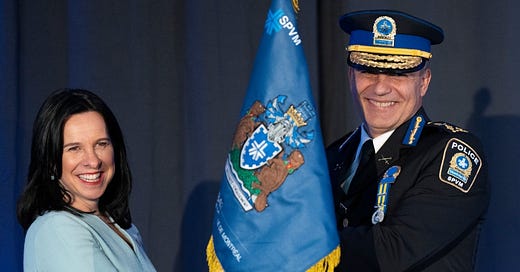Feelings of unsafety and the police-driven agenda
The failures of Projet Montréal have allowed the police brotherhood to define the debate on safety
Montreal feels increasingly unsafe. This is the conclusion of a survey commissioned by the Police Brotherhood (la Fraternité des policiers et policières de Montréal) and released to the public on Monday. According to the survey, two-thirds of Montrealers feel the city is less safe than five years ago and over half believe we need to hire more police.
The survey, released the same day as the SPVM’s annual report, was meant to shape the public debate, and it elicited the predictable responses. The Brotherhood itself used the survey to reiterate its usual demand for more police, and many public officials and media personalities followed suit. Ensemble Montréal, which seems to regard the Brotherhood as its personal think tank, repeated its familiar call for more police and criticized mayor Valérie Plante for being “disconnected from reality.”
La Presse’s Patrick Lagacé joined the attack. Without proposing a particular solution, the columnist ridiculed anyone who responds to feelings of unsafety by claiming the city remains safe by historical or North American standards. “I’m about ready to demand an embargo on these arguments,” he wrote. “We live here, now.”
Plante and her party have yet to respond to the survey, but it is fair to associate them with the claim that Montreal remains a safe city. It is a claim Projet Montréal has made repeatedly in the last three years, usually accompanied by an expression of confidence in the SPVM. The result, tragically, is an incredibly narrow public debate, and a public safety agenda that is effectively driven by the Brotherhood.
There is, after all, another possible response to worsening feelings of unsafety. One could look more closely at the reasons people feel unsafe, examine a full range of possible solutions, and develop a plan of action.
More police, in this case, would not be the solution. Any serious look at the issue would show that police cannot solve the problems we are facing, from homelessness to interpersonal violence, and the SPVM’s oft-repeated commitment to working with community “partners” is another way of masking the reality. In contrast to the police, community groups are massively underfunded, and expecting them to work with police wastes resources and distracts from their mission.
When it comes to homelessness, for example, do we need the police to work with community partners? Or do we need a community sector that is supported financially in fulfilling its mission and thus providing the services, including housing, that people need? When it comes to interpersonal violence, the police can investigate and make arrests, but its contribution to the violence prevention work of community groups (“partners”) is a mystery.
Projet Montréal’s failure to develop such a plan allows the Brotherhood and its allies to define the debate – to the detriment of everyone. Any new evidence of unsafety is used by the Brotherhood to argue for more police, Ensemble Montréal and much of the media join the chorus, and Projet’s only response is to say that Montreal remains a safe city. That is, until the party does exactly what the Brotherhood demands. Since 2020, Projet has increased the police budget more than any city in Canada.
The Left is historically skeptical of the police. Long before the Defund the Police movement, the Left has defined itself by emphasizing the root causes of violence and unsafety, and supporting a range of social programs that address these causes and reduce the need/desire for a police response. In this respect, Projet Montréal has the most right-wing safety policy in the country, while drawing its support from liberal and progressive voters.
The Brotherhood is a politically savvy organization. Its survey, clearly meant to support its demand for more police, also included a question about funding for social services, with 87% of respondents saying more needed to be done to support vulnerable populations. As the Brotherhood likely predicted, this result was largely overlooked in the discussion of the survey – for the simple reason that no political party cares to notice.




